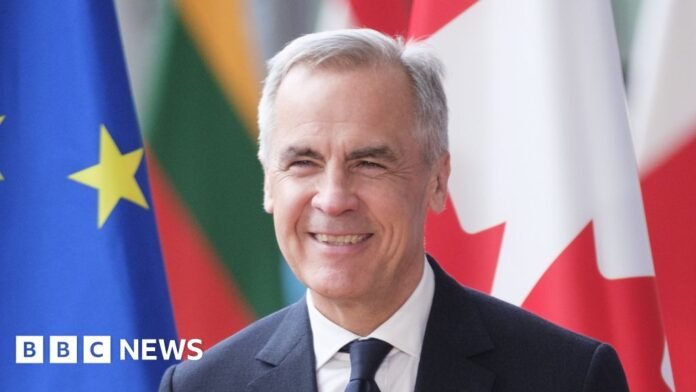Canada’s parliament has passed a landmark bill giving Prime Minister Mark Carney’s government new powers to fast-track major national projects.
The One Canadian Economy Act was passed by the Senate on Thursday, and allows the cabinet to streamline approvals processes and bypass certain provisions of federal laws for projects that could boost the economy.
Supporters have argued the legislation is a critical step in reducing Canada’s dependence on the United States, amid trade tensions sparked by President Donald Trump’s tariffs.
But it has been criticised by Indigenous groups and environmental activists who say expediting the projects could stifle opposition voices.
The legislation does not determine what will be built, but the prime minister has previously signalled that it could be used to construct energy corridors, such as pipelines and electricity grids, and expand mines and ports.
The act will “remove trade barriers, expedite nation-building projects, and unleash economic growth, with Indigenous partnership at the centre of this growth,” Carney said last week.
The government said the act will reduce barriers for internal trade and labour mobility. It will also give the government sweeping powers to approve projects “that are in the national interest”.
That has alarmed Indigenous leaders, who fear they will not be consulted adequately before such projects are approved.
The passage of the bill into law is a significant victory for Carney, and upholds an election promise to remove interprovincial barriers by Canada Day on 1 July.
Trump has imposed tariffs on Canadian steel, aluminium and its auto sector. Carney had campaigned heavily on bolstering the country’s economy to counter tariff threats from the US, with whom Canada does the bulk of its trade.
Paul Prosper, a Nova Scotia senator who belongs to the Mi’kmaq Indigenous group, unsuccessfully attempted to insert an amendment that would require consent from Indigenous groups before a project could go ahead.
He criticised the speed with which the legislation passed, saying that rights holders could have been consulted by “investing a few more months”.
He said he supports development, but the law could allow the government and industry leaders to ignore Indigenous rights.
“No one wants to watch our children grow up in squalor, with no access to clean drinking water, no opportunity for good-paying jobs and no support for our sick and dying. However, we do not want success and progress to come on the backs of Indigenous Peoples,” he said in the Senate, as quoted by CBC.
However a supporter of the bill, Senator Hassan Yussuff, said it was a response to an “urgent and immediate crisis”, in comments reported by CBC.
The legislation states that the government will consult with Indigenous peoples before fast-tracking a project.






